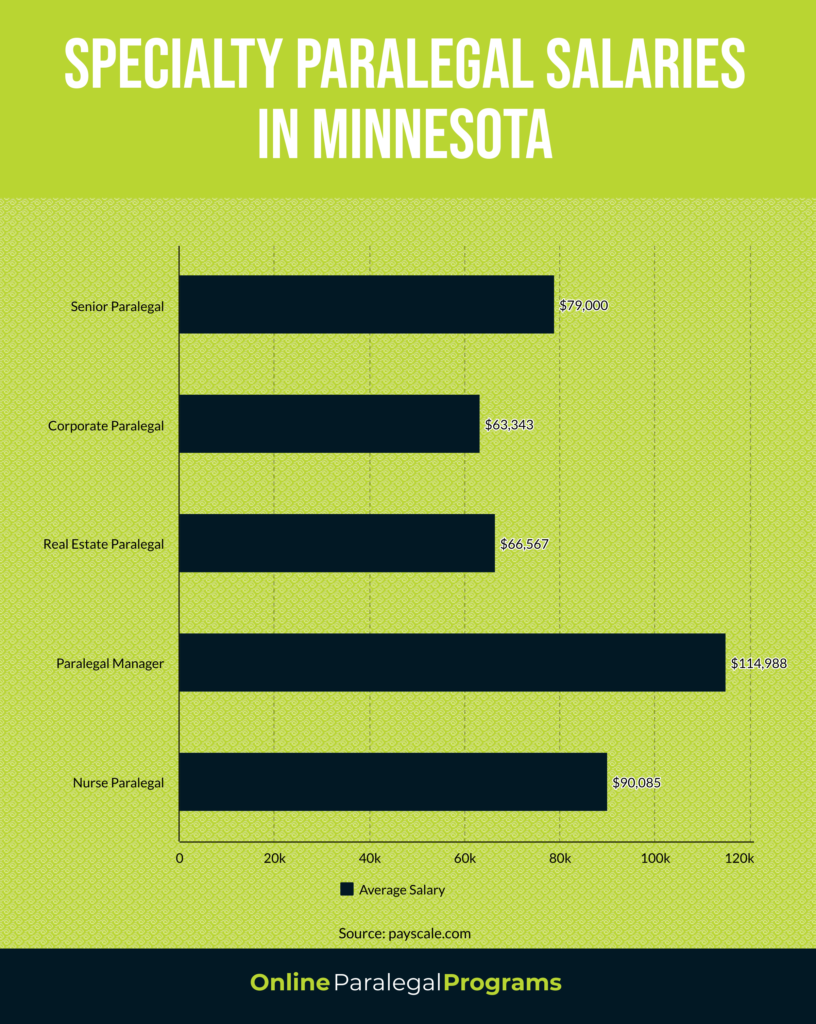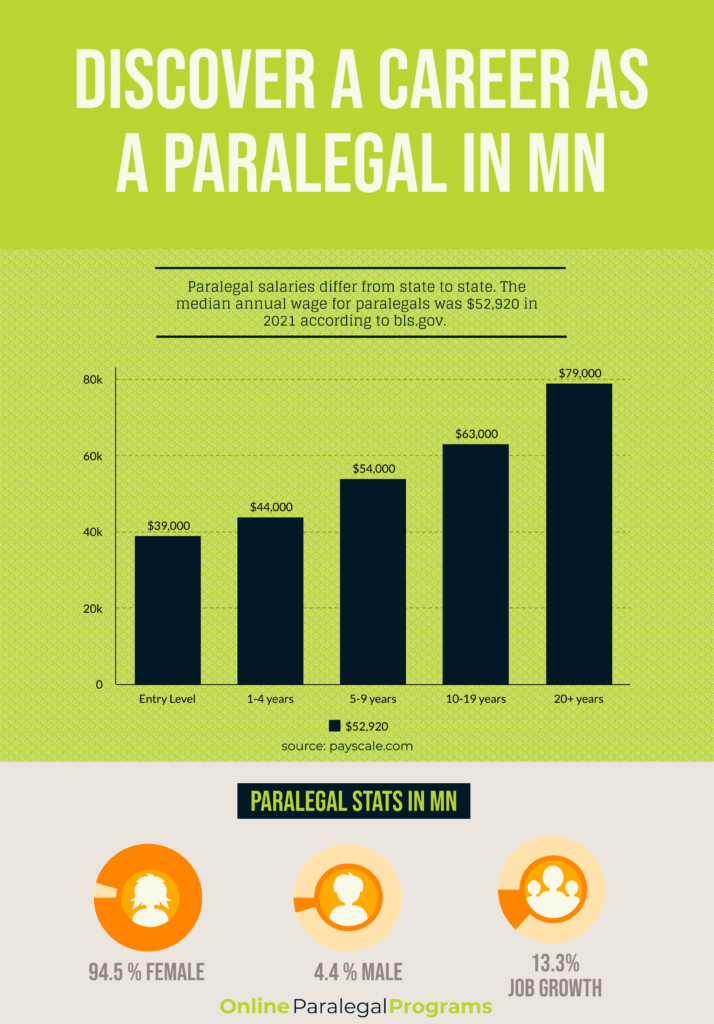When looking into how to become a paralegal in Minnesota, one of the aspects you’ll find is that there are no licensing requirements to work as a paralegal. At first glance, this would suggest that anyone can apply for the position and begin working as a paralegal. However, finding work as a paralegal in Minnesota without some kind of education is difficult to impossible because legal employers prefer to hire paralegals with a degree in paralegal studies. A majority of legal employers look for paralegals that have earned a professional certificate or have earned an associate’s degree in paralegal studies. Higher education shows an employer that you have the requisite knowledge to work in a law firm, be capable of getting up to speed without much trouble, and can blend your education with your employer’s working culture. The unofficial Minnesota paralegal requirements consist of getting an education from a school that has a paralegal program for a certificate, associate’s, or master’s degree. There are no requirements for licensure at the state level, and joining a paralegal or other legal association is purely voluntary. A paralegal can further their career prospects and improve their earnings potential by joining paralegal associations and taking certification exams that qualifies them to become a certified paralegal. Paralegals are not required to obtain licensing in Minnesota or any other state due to the fact a paralegal cannot practice law and has to work under the supervision of an attorney. However, paralegals often find themselves doing many of the same tasks as a lawyer outside the courtroom. They take depositions, interview witnesses, write contracts, wills, trusts, and other legal documents, research information related to a case, and provide support to people who are in need of legal assistance. Becoming a paralegal in Minnesota can be the start of an interesting and storied career that offers opportunities to work in the legal field without the need to attend law school.

Getting a Paralegal Education in Minnesota
Education plays a major role in your ability to work as a paralegal in Minnesota, but you need to make sure that the education you receive is in line with what employers expect. When looking at schools, seek out ones with ABA-approved paralegal programs in Minnesota to get the education you need to find employment and advancement. There are other accrediting organizations that approve paralegal programs, but they aren’t given the same weight as ABA-approved paralegal programs in Minnesota. The ABA, or American Bar Association, accredits a majority of paralegal programs in the U.S. Employers view ABA approval of a paralegal program as a bonus because it denotes that the applicant has been taught to the accepted standards of legal education. Prior to COVID-19, the ABA did not approve paralegal programs that are fully online. However, the ABA changed its stance due to the pandemic and gave tentative approval to fully online paralegal programs as a general rule. Now the ABA has gone ahead and made their stance to approve fully online programs a permanent one. Students now have more schooling options with the addition of ABA-approved paralegal programs in Minnesota that are online Online paralegal programs in Minnesota have existed prior to COVID and were synchronous with the traditional paralegal programs, but they weren’t ABA-approved. A student who wanted to attend a paralegal program online in Minnesota was taking a mild risk that their education wouldn’t be viewed the same as an ABA-approved paralegal program by employers. Instead, a student had to rely on the employer not knowing that they took classes online. Now that the ABA has changed its stance, students can attend school virtually, get a quality education, and have added value to their degree for employers. Another organization that supports educational standards for paralegals is the American Association for Paralegal Education (AAfPE). While the AAfPE is much smaller than the ABA in terms of membership, it’s still the largest and continuously operating organization in the nation that has dedicated itself to promoting standards of quality in paralegal and legal studies education. The mission of the organization is to improve access to legal services through the promotion of quality paralegal education by providing a forum for legal educators and program directors, promoting member participation in AAfPE, promoting high standards for paralegal education and the profession as a whole, promoting research and disseminate information on the paralegal profession, and create partnerships with national and international paralegal organizations. The AAfPE was founded in the mid-1970s and has a solid track record when it comes to improving the quality of legal education across the country. It’s not as well-known as the ABA, but its work is respected by employers, and students who see the AAfPE approval on a paralegal studies program can be assured they’re going to receive an education that meets the standards of the legal industry at large. Paralegal degrees are available at the professional certificate, associate’s, and bachelor’s degree levels. The higher your education, the better your career prospects and salary. Paralegal certificates are mainly intended for students who have already earned a bachelor’s degree in another career field but want to learn how to work as a paralegal. The associate’s degree in paralegal studies is a two-year degree program that qualifies students to begin their career at the entry-level. A bachelor’s degree in paralegal or legal studies qualifies students to work alongside lawyers in roles that are more independent than entry-level roles.
Certification or Licensure for Minnesota Paralegals
As previously mentioned, there is no official paralegal certification in Minnesota. Getting a paralegal certification in Minnesota is entirely voluntary, but it can make it easier to find employment as a paralegal due to the fact certification proves your education and work experience. Minnesota paralegal certification is available at both state and national levels, and there is never such a thing as too much certification. For example: Earning a certification from the Minnesota Paralegal Association (MPA) and The Paralegal Association (NALA) can help you improve your job prospects by showing a potential employer that you’re more than competent as a paralegal and can prove it.
Minnesota Paralegal Association
The Minnesota Paralegal Association (MPA) offers support to Minnesota paralegals in the form of advocacy, communicating and connecting with national paralegal organizations, offering networking opportunities to members, supporting continuing education, and promoting diversity of its members. Membership with MPA is voluntary, but becoming a certified paralegal through MPA enables a paralegal to use MnCP after their name. The use of the MnCP designation shows that you have joined the MPA, are familiar with state law in Minnesota, and have validated your education and work experience. In order to become a MnCP, an applicant must be able to meet one of the following qualifications. They include:
- Associate’s degree in paralegal studies and four years of substantive paralegal experience.
- Bachelor’s degree in paralegal studies and two years of substantive paralegal experience.
- Bachelor’s degree in a non-legal discipline obtained a post-baccalaureate certificate in paralegal studies and has two years of substantive legal experience.
- Bachelor’s degree in any discipline and four years of substantive paralegal experience.
- PACE registered paralegal.
- CORE or NALA registered paralegal.
- High school diploma and ten years of substantive paralegal experience with 10 CLE credits.
- Juris doctorate and two years of substantive paralegal experience and no disbarment or suspension from the practice of law.
Getting accepted into the MPA also grants you membership in the National Federation of Paralegal Associations, and gives you access to the benefits of being associated with a national paralegal organization.
NALA The Paralegal Association
NALA was established in 1976 and offers the Certified Paralegal (CP) credential. Earning the CP credential also serves as a form of Minnesota paralegal certification in lieu of state licensure. There are other options for paralegal certification in Minnesota, but NALA’s CP credential is the most well-known due to the fact the exam is rigorous and expects a lot from the paralegal sitting for the exam. This can seem like a lot to ask of a paralegal, but in light of the fact there is no state of Minnesota paralegal certification, the CP credential from NALA gives a paralegal the opportunity to prove their knowledge, experience, and education to prospective employers. About 84% of examinees pass the CP exam which shows how rigorous the exam is. Taking the CP exam is ultimately worth it as it can increase a paralegal’s salary by almost $5k a year. Employers recognize the value of a paralegal that holds a CP certification and are willing to pay a higher wage as a result. NALA is an organization that’s similar to the Minnesota Paralegal Association but is more focused on maintaining and improving standards of employment for paralegals. The organization binds members to the NALA Code of Ethics and Professional Responsibility as a way of upholding standards among members. Violation of the code may result in a member being suspended or a suspension of the certification credential. The organization recognizes that employers are not held to the organization’s professional standards, but it does provide an outline of minimum qualifications for paralegal employees. Employers tend to have their own internal standards of hiring, but some may follow the guidelines established by NALA. An aspiring paralegal can use the standards as their personal guideline for what employers expect of a paralegal. Using the standards in this fashion helps a paralegal navigate employer expectations of a potential paralegal employee.

Job Market and Salary for Paralegals in Minnesota
The median Minnesota paralegal salary in 2021 is $60,230. The average pay for entry-level paralegals in Minnesota is $46,922 and the average Minnesota paralegal salary for experienced paralegals is $75,084. This demonstrates the fact that a newly-graduated paralegal can earn a very reasonable salary regardless of where they live in Minnesota. The average starting salary for paralegals in Minnesota demonstrates that for this profession at least, location is not an issue. Paralegals who live in or near large population centers are likely to earn more due to cost of living factors, but a paralegal who lives and works in more rural areas of Minnesota can also earn a better-than-average wage. Paralegal jobs in Minnesota are found throughout the state, and Minnesota is home to many major corporations that hire paralegals to perform work that requires someone with legal training. Law offices are the number one employer of paralegals with local, state, and federal governments following close behind. Students who graduate from a paralegal program will find that employment in the field is steady and reliable along with a commensurate Minnesota paralegal salary for their level of education. The amount of available Minnesota paralegal jobs is most likely to grow in number as corporations look to slim down their legal department budgets and hire people with legal experience that don’t command the salary of an attorney. Law firms of all sizes will always need paralegals to maintain their daily operations, and will always be a reliable source of employment for paralegals in Minnesota. Paralegals who want to explore their career options will find there are plenty of opportunities in both the legal field and through corporate entities. A paralegal who first gains their experience in a law firm, then moves on to work in the corporate sector, can find themselves doing interesting work and a good Minnesota paralegal salary that’s commensurate with their experience.
Is becoming a paralegal a good choice?
Related:
Top 10 Paralegal Programs in Minnesota
How to Become a Paralegal in Minnesota
Ultimate Guide to State Paralegal Associations